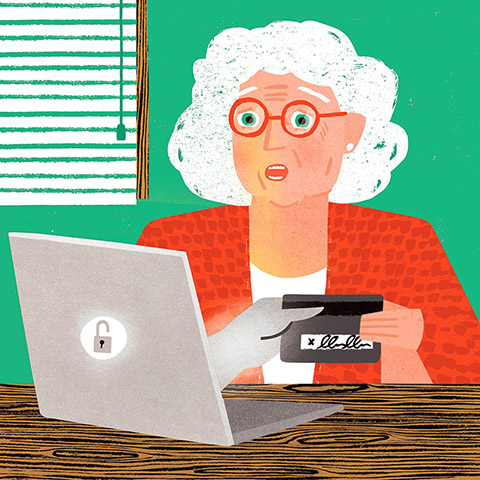Seniors have grown so concerned about their safety online that some avoid even low-risk activities such as online banking and shopping that could make their lives easier, a U of T study has found.
Cosmin Munteanu, a professor in UTM’s Institute of Communication, Culture, Information and Technology, and Hiba Rafih, a master’s student in information, recently conducted in-depth interviews with 10 people between the ages of 60 and 80 in their homes and observed their online behaviour, particularly with respect to banking, shopping and pharmacy refills. If anything, says Munteanu, they were overly prudent. Although none of the interviewees had ever fallen for a scam, they sometimes flagged as suspicious bona fide announcements from charities or emails from friends.
A 66-year-old retiree, for example, was so concerned about her digital security that she took her laptop to a trusted dealer once a month for inspection – at considerable cost and effort. It wasn’t that she lacked computer proficiency. She’d had a computer for at least a decade and used it to watch videos, conduct research and write emails.
Munteanu found the seniors in his small study were particularly mistrustful of shops and banks that lack real-world locations for consumers to visit, such as Amazon or Tangerine. “Older adults trust the security of in-person transactions more than online ones,” he says. “They want to know who to talk to if something goes wrong.”
The seniors were also reluctant to try anything new online unless there was a significant benefit – and this benefit had to outweigh the perceived risk. Everyone makes this calculation, but seniors assign more weight to the risk. As a result they may not use technologies that would make their lives easier. “Good luck getting them to order Foodora or UberEATS,” says Munteanu.
Digital literacy tends to fall off after 60, he adds, in part because people are less inclined to keep up with new technologies after they retire. But the learning process is further eroded by a lack of trust in online services that are new or unfamiliar to them. If people “don’t trust the provider, they’re not going to engage with the service,” says Munteanu. “They’re not going to try.”
His advice to people with older relatives: Emphasize the benefits, as well as the risks, of online activities.







No Responses to “ Seniors Want to Know Whom They Can Trust Online ”
I associate with many seniors, all of whom enjoy using tech devices more now than they did a couple of years ago. They stay active, and their goal is to live a longer healthier lifestyle. I am curious to know when and how the data for this article was gathered. Seniors are a growing population and are able to take time to learn new skills. I see many doing just that.
Prof. Cosmin Munteanu responds:
The study was conducted mostly in the early part of summer 2017 over several months. We used a technique called "Contextual Inquiry" to extract the data.
We are working on completing the analysis in a formal way and hope to create a more extensive public report soon.